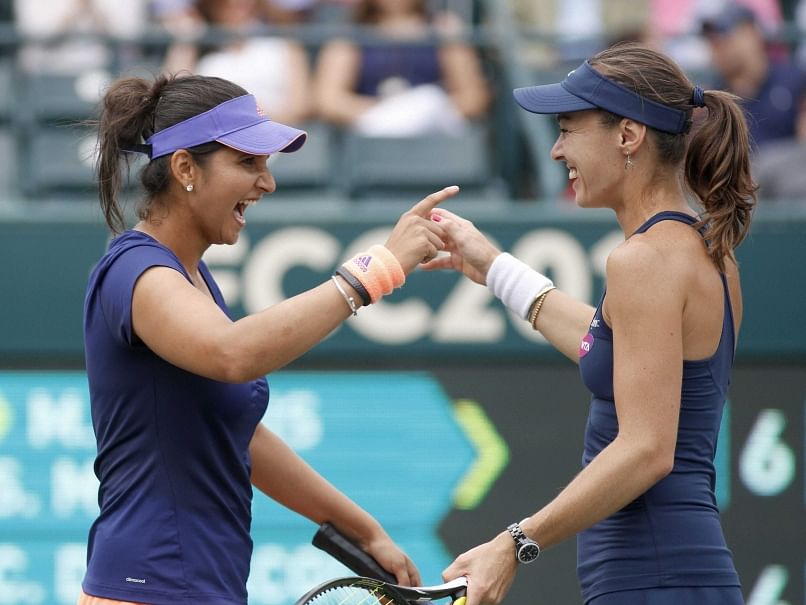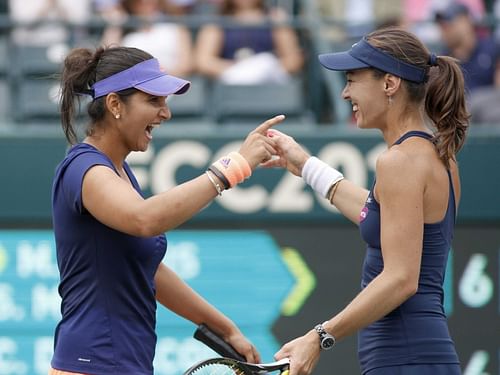
Being Sania Mirza: Will the World No. 1 doubles player ever get to fully enjoy her success?

Roiling sectarianism has gripped India, but Sania Mirza’s achievement has provided the perfect antidote to calm it. Almost seven seas and across a couple of oceans away, in Charleston, as Mirza and her doubles partner Martina Hingis won their 14th consecutive match – and third straight title – since teaming up, an entire nation rejoiced in unison at the milestone the Hyderabadi had set.
Mirza’s poignant words
Following her win, the 28-year-old had a lot of words to share. And so she did, in her candid manner that has long defined her. They were poignant in their inspirational tone for the younger generation waiting on the sidelines for their chance to represent India.
But the three-time Grand Slam champion didn’t mince her words at her naysayers, bluntly putting across how their scepticism and criticism spurred her determination to succeed further. That wasn’t entirely surprising, given the wave of negativity that keeps dogging her heels – it’s almost like her critics are constantly waiting for the slightest of mis-steps from her.
No other player has been subjected to such judgemental bias. And in spite of all her supporters standing by her through thick and thin, none of us can imagine the pain of going through the same gamut of prejudice over and over again.
A lot may have been forgiven by her, but not much has been forgotten. In many ways, through her words, Mirza held a mirror in front of those questioning her nationality and her contribution to the country. Though she has frequently reiterated her commitment ad nauseam – through her words and by her actions – her efforts have never been enough for the doubters.
The deep-seated vehemence of her supposedly turning into a deserter does beg the question – had Sania Mirza been someone else and had a different name, would the sceptics have been so harsh on her? The answer’s not really easy. One could say no, but events and their chronology would cast a doubt about that, while an affirmative response would only prove the bleaker undercurrents running in our society, as a whole.
Sectarianism, gender versus gender or both?
An interesting contradiction emerges in parallel. Many of our cricketers hail from a similar socio-cultural background as the Australian Open mixed doubles champion, but haven’t been subjected to such vitriolic discrimination in case of their failures. This puts a different slant on the status quo as it is, perhaps even impacting it further. One more question then begs to be asked: is gender that big a contributing factor in determining the support lent to athletes and hopefuls?
Mirza’s words extended to this aspect of gender-oriented favouritism as well, and the change in the general attitude she’s optimistic of coming about given her success and those of her fellow female sporting examples. Beyond this though, there also does exist another facet of favouritism that needs to be eradicated, but one for which no change seems to be forthcoming anytime soon.
When Mirza spoke of starting out and playing on courts made of cow manure, the candidness struck out for two reasons. One was for its painful embarrassment. And the other for the sheer apathy that’s still prevalent for other sports, regardless of the successes achieved by their representatives.
Need for change in perspectives
From a broader perspective, the indifference continues to run rampant. To give an example, the Indian ice hockey team was miserably struggling to finance its participation at the upcoming Challenge Cup Division 1 in Kuwait; it was only after focused and driven efforts to raise money, including a hefty donation from the Gautam Gambhir Foundation, that the Indian team was able to confirm its participation in the tournament.
The support offered by Gambhir through his foundation was completely altruistic, but it reflects the chasm between cricket and other sports – including tennis – in our country. There are repeated doubts raised about the calibre of our sportspersons when they are unable to win trophies and medals at significant events. But most of us are oblivious – and blissfully so – to the difficulties that these sportspersons have to endure to participate in the events in the first place.
If we want – and expect – change, we need to widen our horizons with regard to sports in India. We can’t just clamour for betterment, without really having a deeper introspection on what exactly we need to alter, and where we need to alter it.
To put it more bluntly, we can’t lament about the lack of chickens when no effort is being put to hatch the eggs. And Sania Mirza has just proved that to us most emphatically.